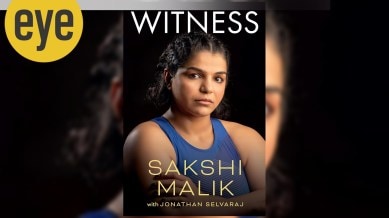Sakshi Malik’s Witness shows us the insecure life of elite athletes and the murky world of Indian sport
It’s ironic how bravely Malik talks about her shortcomings because on the wrestling mat — be it at the inter-school level or Olympic medal playoff — she admits to being consumed by fear.

“I’ve never enjoyed the actual act of confrontation,” writes Sakshi Malik. She goes on to describe her life that is littered with confrontations. Her countless bouts on the wrestling mat. The fights with her family to marry long-time partner Satyawart Kadian. Challenging the patriarchal set-up. Grappling with her fears. And, of course, taking on the establishment in her battle for justice.
Malik’s Witness — co-authored with award-winning sports journalist Jonathan Selvaraj — provides a breath of fresh air by breaking away from the usual tropes.
It isn’t as candid as, say Andre Agassi’s Open (2009) — one of the benchmarks of bare-it-all storytelling — but it still is brutally honest. In her memoir, Malik takes the witness stand to give a ringside view into the insecure life of an elite athlete and the murky world of Indian sport.
Unsurprisingly, all the early headlines upon the book’s release have been around Malik’s bout with former Wrestling Federation of India president Brij Bhushan Sharan Singh, whom she and other wrestlers have accused of sexual harassment.
Unsurprisingly, again, that’s how the book opens — with Malik reliving the painful memories of being dragged on the streets of New Delhi by the police during the height of the protests, and the subsequent decision to throw their medals into the Ganga owing to the delay in taking action against Brij Bhushan.
She takes the readers right to the heart of all the behind-the-scenes discussions: from the highway dhabas in Haryana where the first protest was planned in January 2023 to the house of the then-Sports Minister Anurag Thakur, where it ended; from the back seats of cars to Jantar Mantar. This, apart from her many meetings with Brij Bhushan as a wrestler, where she claims the BJP MP harassed her.
Some of the facts have been disputed. But it is Malik’s truth and she has stood by it.
Witness, however, is much more than this this episode. The wrestler is careful to not make her autobiography only about Brij Bhushan and it is richer because of that. Because the only Indian woman to win a wrestling medal at the Olympics has been elusive about her story.
Malik hadn’t done much before the Rio Olympics that would make her a solid medal prospect at those Games. Yet, defying everyone’s expectations, she became one of the only two Indian medal winners in 2016. From then on, she’d been on a downward spiral and never could reach the same heights again. It’s almost as if the wrestling gods smiled on her for that one August day.
Malik dedicates an entire chapter where she confronts her struggles, admitting that even today she does not know what had gone wrong, opens up about how it impacted her mentally and the extent to which her family went to reverse her fortunes.
It’s ironic how bravely Malik talks about her shortcomings because on the wrestling mat — be it at the inter-school level or Olympic medal playoff — she admits to being consumed by fear.
This is how she describes her first-ever bout: “I should have been happy and excited to wrestle but I felt my stomach sink before my first bout. That sense of dread heightened as my foot sank into the soft synthetic plastic mat. It peaked as I crossed the red border of the nine-metre-wide circle that I’d have to fight inside for the next six minutes. It’s a fear that I’ve carried to the end of my career. I’ve never enjoyed the actual act of confrontation.
Malik’s openness is complemented by Selvaraj’s descriptive style, which in subtle ways educates the readers about the finer nuances of wrestling. In the same chapter, Malik’s articulation of different wrestling moves and their desi names have been deftly worded by Selvaraj. This elevates Witness from being just another memoir and turns it into a handbook of sorts for anyone willing to learn the basics of the sport.
Perhaps, one of the most important chapters in the book — and also one of the boldest talks by an Indian woman athlete — is when she opens up about her body: The ‘14-inch thick biceps’ that made her self-conscious (“an Italian wrestler pointed to my arms… saying, ‘Hey big arms!”), the urge to dress up (“Every female wrestler wants to look pretty”) and wrestling with self-doubts over how she looked and what she wore (“I’ve had my fingers twisted, my hair pulled out by their roots and my ACL ripped. But it felt far more stressful to wear a sleeveless dress for the first time”).
It would have been far easier for Malik to glorify her Olympic medal and focus on the wrestlers’ protests against Brij Bhushan. But she’s courageously gone beyond that to speak about intimate issues that make Witness as much a book on rights and feminism as it is about wrestling.
Given the severe paucity of quality sports literature — especially Olympic sports — in India, Witness, like Abhinav Bindra and Rohit Brijnath’s A Shot at Glory (2011), becomes an automatic essential reading.